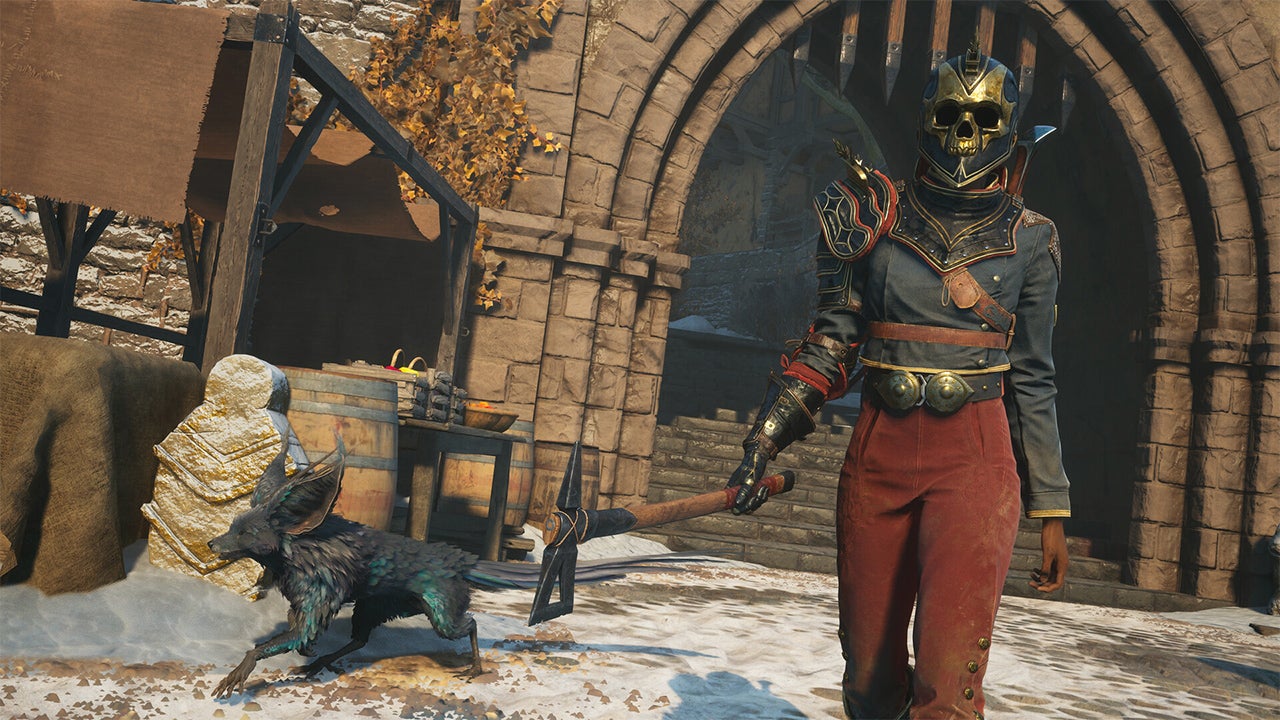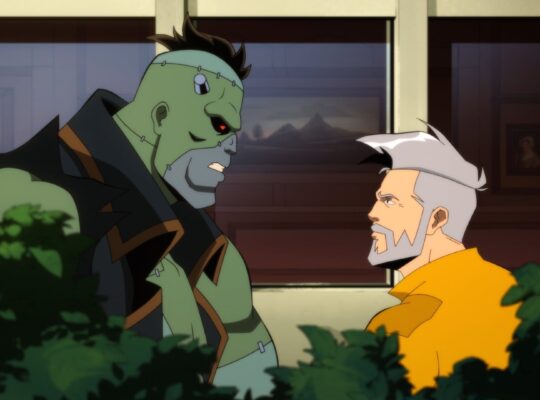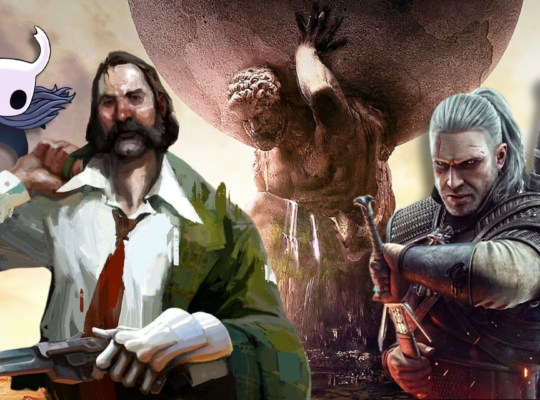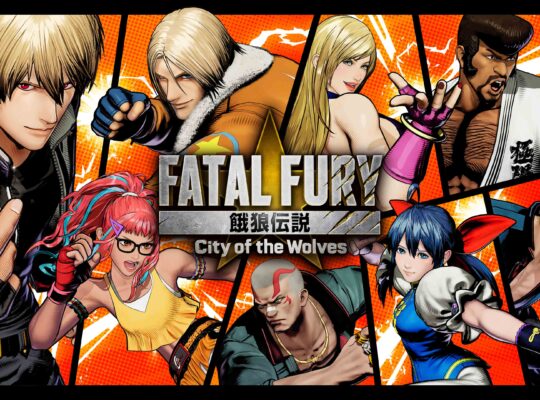God killing has become a staple in games starring Kratos, Bayonetta, Terra Branford, and countless other characters. With action-RPG soulslike Flintlock: The Siege of Dawn, a new pair of god killers by the names of Nor and Enki joins their ranks. With a familiar tale about being wronged by the various gods of this world and becoming consumed by revenge, it never quite manages to reach the peaks of its peers, borrowing lots of elements from other genres without standing out in any of them. But while that keeps it from true greatness, Flintlock still continuously found ways to entertain me with flashy combat and swift movement across my 26-hour near-completionist run.
I was late to join the fan club that formed around developer A44’s previous game, Ashen, after its debut back in 2018, but it quickly found its way into my list of favorite soulslikes once I did, thanks in part to how enjoyable it was to vanquish its big bosses with a co-op partner. Six years later A44 is back with Flintlock, and while it may look vastly different from Ashen, a lot of the same foundation can be felt in its combat, storytelling, and overall design. That’s not to say it’s exactly the same, as efforts were clearly focused toward making the combat more brutal and cinematic with some really cool finishers while also introducing new mechanics like an experience multiplier that enhances the usual risk-reward tension of soulslike games.
Nor begins as a competent and headstrong soldier looking for glory that I would definitely classify as the “look before you leap” type, while her partner Enki is an adorable yet powerful god who has secluded himself from the world. He has his own reasons for joining Nor after her journey becomes one of revenge, assisting her with both his magical abilities and wisdom about his realm, and his an energetic and humble curiosity when learning of things he’s missed makes his part of the story by far the highlight. Unfortunately, Nor’s vengeful tale does occasionally fall into various cliches, and (avoiding spoilers) the minimalist cutscenes that occur from the perspective of another NPC that travels with them as you go between locations often feel like they are missing parts of the story. The bond that develops between Nor and Enki across their journey isn’t groundbreaking stuff, but watching them was still enjoyable to the end and did leave me curious what could happen next if Flintlock were to get a sequel.
You only get a small bit of exposition at the start before you’re thrown into the middle of a war against the undead, but besides a big moment with a larger than life foe near the end of the prologue, this setup failed to give me a reason to care about the war or the people that I was fighting for. That’s mainly due to nearly all the NPCs being either reluctant or outright dismissive of Nor’s presence. The earliest hours of Flintlock are a bit rough in general as you have limited combat options, which can make fights feel much shallower and had me worried that it might not expand enough to become interesting. Thankfully, that changes once you gain access to more weapons and a few upgrades on the skill tree, but it took a bit longer than I would have liked.
Combat is fast and flows extremely well, chaining attacks with easy.
Aside from the main characters, four NPCs join your camp and assist by offering various upgrades to your weapons – but apart from one quest chain involving a brother and sister in the group, they were pretty forgettable. It was one of those situations where you meet characters in the opening hour and then they disappear, only to need saving or assistance hours later. If they weren’t placed on the main path, I probably would have written them off as dead and not thought about them again. On the other hand, the various NPCs you’ll come across through sidequests are more memorable: There were two brothers running an arena I could enter, and a, uh… unique character that increased my maximum health potions, offered information, and provided alternate outfits after liberating a town.
Combat is fast and flows extremely well; attacks chain into each other with ease and you can really feel the impact with each hit of your axes, hammers, rifles, grenades, and magical abilities that come courtesy of Enki. Flintlock also offers various armor pieces for you to find that provide unique abilities, like detonating enemies after stacking curses, splitting grenades into two, or increasing your attack range. These armor options all have set bonuses, so you’re encouraged to stack at least two of them for an enhanced effect, and that system expands with more interesting choices later on.
Enki has the ability to curse enemies, which stuns them and offers Nor the opportunity for a very flashy move that will either rip off armor or straight-up execute them, depending on the type of enemy and its health. Enki can also be upgraded to restrain, knock down, distract, and attack on his own, to the point where he often felt a bit too strong even when I was playing on the hardest of the three difficulties. I mean, he is a god, so I guess it’s fair, but in later areas I could take out entire groups of certain enemies with only his attacks. (I pulled this off thanks to a creative build that detonated an enemy after stacking four buffs within 10 seconds.
Top that off with super moves like a storm that knocks enemies up or a beam that deals major damage and stun, and I almost felt bad for them. This ended up being a great way for me to farm experience (called Reputation), since – similar to Devil May Cry and Bayonetta – you earn a temporary experience multiplier that is built up by fighting without Nor getting hit, and it’s hard for her to take damage when Enki is doing all the work. While it was challenging to amass a giant multiplier during the early game, after picking up more abilities and weapons to swap between I found myself routinely going past 100%, with my top being around 170%. But until then, that system encouraged me to use different weapons and variations on my regular combos in a way I haven’t seen done in a soulslike before.
Sometimes Enki felt a bit too strong, clearing out entire groups alone.
There are some issues with the combo multiplier mechanic, though, and the main one is in enemy unpredictability. By that I don’t mean an attack that catches me off guard, causing me to miss a block or parry – those are par for the course across a decent variety of enemies, ranging from various undead creatures, knights with large shields or broadswords, large chocobo-shaped birds, spiders, and (of course) various gods. What’s troublesome is that there are a number of enemy attack animations that seemingly lock on to you, meaning that when dodging with either a standard dodge or by jumping away the enemy will swing around at a 90-180 degree angle and still hit me despite it looking like I should’ve gotten away. The good news is that I only saw this in fights with regular enemies rather than big bosses where it really would’ve been a problem.
You have three skill trees that improve your gun, magic, and melee damage, and their branches end up blending together as you approach the top of them. This structure allows you to bypass the lower upgrades on one tree if you want to prioritize certain upgrades over others, while still accessing its high-tier abilities eventually. I enjoyed this because I was able to fully spec into the magic tree early, which gave me the ability to have Enki suspend enemies in the air and, later on, provided a single self-revive that refreshed after resting. This was a godsend in the later boss fights, where one-shot kills aren’t uncommon – they’re avoidable and counterable, but accidents happen! After grabbing that skill at the top I simply bought the highest upgrades of the other trees before working my way back down to the cheaper options as I wanted them, instead of having to work my way up through ones I didn’t.
Flintlock’s tighter campaign length also means that nearly every path in the world leads to something impactful, and you can use Nor’s ability to double jump and air dash to find secrets like new weapons or health increases. There are also typically shortcuts to get you back to the main path quickly – these can either take the form of rest points you can fast travel to, or an interactable skull on a pedestal which activates energy rifts in the sky that Nor and Enki can fly to in quick succession. These rifts are flashy and versatile, and besides acting as shortcuts to return to your objective, they often offer a way for you to reach areas that would be otherwise inaccessible. They are probably one of my favorite mechanics in Flintlock as they are also placed to quickly get you back to a main boss or smaller boss-like enemies if you die.
Each open zone has a number of sidequests, with a majority of their objectives placed close to one another, making it easy to finish them all in quick succession and encouraging you to handle them as they pop up. There are a few exceptions to this rule: One quest had me scaling a mountain to find the daughter of an NPC who was unable to make the climb for their annual meetup, while another had me searching a mine for a worker that had gone missing. Many of the sidequests were simple yet enjoyable and often had twists, like a knight who offered to take his army and vacate their outpost if I defeated him in combat without using my gunpowder-based weapons – when I broke that rule during our duel, all bets were off.
Placed around the world are also various notes and signs that have a glow effect to let you know they can be collected, which are primarily in places you will visit when completing quests and offer varying degrees of insight into the world. There are also about 30 flags hanging across the first two zones that you can destroy for a Reputation reward, as well as a collectible when you’ve destroyed all of them in a zone. Compared to other RPGs, this relatively trim list of extras was a breath of fresh air since I didn’t have to worry about collecting hundreds of objects, baubles, or other collectibles, ultimately making me want to explore its world even more.
There is also a very fast and simple minigame called Sebo that is played by moving coins on a board to form a triangle within a limited number of turns while an opponent attempts to block you. These Tic-Tac-Toe-like matches rarely last more than two minutes each, and with every victory the amount of Reputation you earn increases, making strings of wins pay off bigtime. There is a bit of depth added as you progress in that boards and the starting locations of coins change, and new strategies form by finding special coins hidden in wells throughout the world that could offer the ability to swap coin locations, jump over coins, or form barricades to prevent movement.












